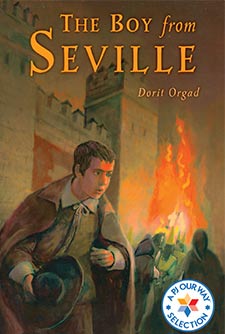The Girl with the Secret Name
Beatrice de Luna grew up in a wealthy family in 16th century Portugal. She had absolutely no idea about her family’s dangerous secret. Her 12th birthday changed everything.
Average Rating
( hint: Login to leave a review! )
73 Reviews
Leave Review
What the Book Is About
Jewish Content and Values
Content Advisory
What the Book Is About
Gracia Mendes Nasi was born in Portugal in the year 1510, and this book tells the story of her incredible life.
Gracia spent the first twelve years of her life thinking she was a Christian girl named Beatrice de Luna. On the eve of her bat mitzvah year, she learned that her parents were Jews who had fled from Spain and now had to practice their Judaism in hiding.
After marrying Francisco Mendes, a wealthy spice trader, Gracia learned that he and his family were using their resources and connections to save the lives of Jews being persecuted under the Inquisition. After Francisco died, Gracia became one of the wealthiest and most powerful women in Renaissance Europe. She spent the rest of her life moving from country to country, staying one step ahead of antisemitic persecution and doing whatever she could to save the lives of her fellow Jews.
Readers will be inspired by this action-packed story of a real-life historical figure who wasn’t afraid to stay true to her values and fight for the lives of others.
Gracia spent the first twelve years of her life thinking she was a Christian girl named Beatrice de Luna. On the eve of her bat mitzvah year, she learned that her parents were Jews who had fled from Spain and now had to practice their Judaism in hiding.
After marrying Francisco Mendes, a wealthy spice trader, Gracia learned that he and his family were using their resources and connections to save the lives of Jews being persecuted under the Inquisition. After Francisco died, Gracia became one of the wealthiest and most powerful women in Renaissance Europe. She spent the rest of her life moving from country to country, staying one step ahead of antisemitic persecution and doing whatever she could to save the lives of her fellow Jews.
Readers will be inspired by this action-packed story of a real-life historical figure who wasn’t afraid to stay true to her values and fight for the lives of others.
Jewish Content and Values
- Gracia and her family lived in a time when it was illegal to be Jewish, but they continued to practice their Judaism in secret. They did this in a few ways, such as hiding the mezuzah on their doorpost under a cross, lighting a single Shabbat candle in front of a mirror on Friday nights, and performing Jewish rituals in the privacy of their basement.
- Gracia was inspired by Queen Esther, who also kept her Judaism hidden but eventually saved her people and became a great Jewish hero.
- Gracia married her husband Francisco under a chuppah (wedding canopy) made from a tallis (Jewish prayer shawl) and tore her clothing in mourning when he dies. Later in her life, Gracia sat shiva for her sister after she died.
- In addition to feeding hungry refugees and fighting to save Jewish lives, Gracia Mendes Nasi also funded the printing of Jewish books, including the Ferrara Bible, which was the first Tanakh published in Spanish.
Content Advisory
Dona Gracia Mendes Nasi and her family faced antisemitism throughout their lives, including the oppression and violence of the Inquisition. There are references to antisemitic conspiracy theories, Jews being imprisoned, forced to live in ghettos, being burned at the stake. However, there is nothing graphic and the writing in this book is age appropriate.
What the Book Is About
What the Book Is About
Gracia Mendes Nasi was born in Portugal in the year 1510, and this book tells the story of her incredible life.
Gracia spent the first twelve years of her life thinking she was a Christian girl named Beatrice de Luna. On the eve of her bat mitzvah year, she learned that her parents were Jews who had fled from Spain and now had to practice their Judaism in hiding.
After marrying Francisco Mendes, a wealthy spice trader, Gracia learned that he and his family were using their resources and connections to save the lives of Jews being persecuted under the Inquisition. After Francisco died, Gracia became one of the wealthiest and most powerful women in Renaissance Europe. She spent the rest of her life moving from country to country, staying one step ahead of antisemitic persecution and doing whatever she could to save the lives of her fellow Jews.
Readers will be inspired by this action-packed story of a real-life historical figure who wasn’t afraid to stay true to her values and fight for the lives of others.
Gracia spent the first twelve years of her life thinking she was a Christian girl named Beatrice de Luna. On the eve of her bat mitzvah year, she learned that her parents were Jews who had fled from Spain and now had to practice their Judaism in hiding.
After marrying Francisco Mendes, a wealthy spice trader, Gracia learned that he and his family were using their resources and connections to save the lives of Jews being persecuted under the Inquisition. After Francisco died, Gracia became one of the wealthiest and most powerful women in Renaissance Europe. She spent the rest of her life moving from country to country, staying one step ahead of antisemitic persecution and doing whatever she could to save the lives of her fellow Jews.
Readers will be inspired by this action-packed story of a real-life historical figure who wasn’t afraid to stay true to her values and fight for the lives of others.
Jewish Content and Values
Jewish Content and Values
- Gracia and her family lived in a time when it was illegal to be Jewish, but they continued to practice their Judaism in secret. They did this in a few ways, such as hiding the mezuzah on their doorpost under a cross, lighting a single Shabbat candle in front of a mirror on Friday nights, and performing Jewish rituals in the privacy of their basement.
- Gracia was inspired by Queen Esther, who also kept her Judaism hidden but eventually saved her people and became a great Jewish hero.
- Gracia married her husband Francisco under a chuppah (wedding canopy) made from a tallis (Jewish prayer shawl) and tore her clothing in mourning when he dies. Later in her life, Gracia sat shiva for her sister after she died.
- In addition to feeding hungry refugees and fighting to save Jewish lives, Gracia Mendes Nasi also funded the printing of Jewish books, including the Ferrara Bible, which was the first Tanakh published in Spanish.
Content Advisory
Content Advisory
Dona Gracia Mendes Nasi and her family faced antisemitism throughout their lives, including the oppression and violence of the Inquisition. There are references to antisemitic conspiracy theories, Jews being imprisoned, forced to live in ghettos, being burned at the stake. However, there is nothing graphic and the writing in this book is age appropriate.




